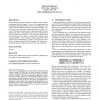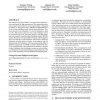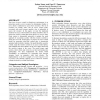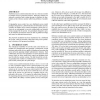102
click to vote
SACMAT
2003
ACM
15 years 7 months ago
2003
ACM
Authorization policy infrastructures are evolving with the complex environments that they support. However, the requirements and technologies supporting context are not yet well u...
120
click to vote
SACMAT
2003
ACM
15 years 7 months ago
2003
ACM
Role-based access control (RBAC) is recognized as an efficient access control model for large organizations. Most organizations have some business rules related to access control...
127
click to vote
SACMAT
2003
ACM
15 years 7 months ago
2003
ACM
In this paper we describe the work devising a new technique for role-finding to implement Role-Based Security Administration. Our results stem from industrial projects, where larg...
107
click to vote
SACMAT
2003
ACM
15 years 7 months ago
2003
ACM
A Generalized Temporal Role Based Access Control (GTRBAC) model that captures an exhaustive set of temporal constraint needs for access control has recently been proposed. GTRBAC�...
127
click to vote
SACMAT
2003
ACM
15 years 7 months ago
2003
ACM
In large organizations the administration of access privileges (such as the assignment of an access right to a user in a particular role) is handled cooperatively through distribu...
136
click to vote
SACMAT
2003
ACM
15 years 7 months ago
2003
ACM
The focus of access control in client/server environments is on protecting sensitive server resources by determining whether or not a client is authorized to access those resource...
123
click to vote
SACMAT
2003
ACM
15 years 7 months ago
2003
ACM
Traditional access control mechanisms rely on a reference monitor to mediate access to protected resources. Reference monitors are inherently centralized and existing attempts to ...
SACMAT
2003
ACM
15 years 7 months ago
2003
ACM
101
click to vote
SACMAT
2003
ACM
15 years 7 months ago
2003
ACM
We investigate the cost of changing access control policies dynamically as a response action in computer network defense. We compare and contrast the use of access lists and capab...
126
click to vote
SACMAT
2003
ACM
15 years 7 months ago
2003
ACM
Role-based Access Control (RBAC) models have been implemented not only in self-contained resource management products such as DBMSs and Operating Systems but also in a class of pr...




